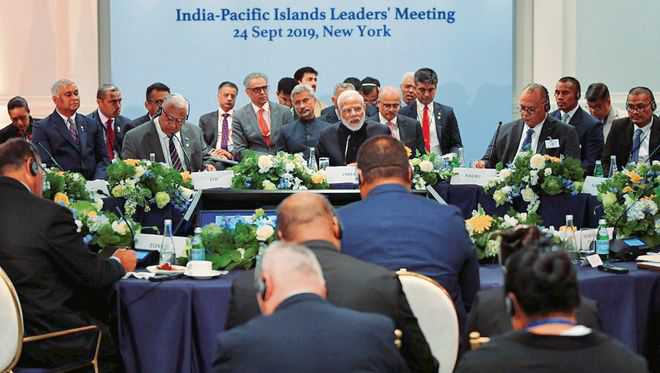
Lt Gen Shamsher Singh Mehta (retd) & Gautam Bambawale
Ever since the US military established the Indo-Pacific Command, and as senior US Cabinet members, including President Trump, continue to focus attention on it, this region has become the new cynosure in any discussion on international ties. India, too, has established an Indo-Pacific Division in its MEA, and even ASEAN, which only works on consensus, has announced a new Indo-Pacific outlook.
How should this new geographical and strategic construct be viewed? Is it a game changer, or is it merely to contain China? This subject will come up for discussion at the 5th Pune Dialogue on National Security, scheduled for November 8-9.
The big geopolitical change which has impacted the globe over the past few decades, undoubtedly, is the rise of China. Many analysts believe that the Indo-Pacific concept has been drawn up to include India, in the hope that it will help balance out China. From such ideas comes the US definition of the Indo-Pacific, as stretching from the west coast of India to the west coast of the US. Moreover, the stress on free and open Indo-Pacific implies that no country can circumscribe freedom of navigation or overflight, and that none can dominate these seas. The freedom to engage in unimpeded commerce is another aspect. Such approach aims at taking on the rising power in the world, and has its origins in classical theories of the balance of power. Does this hold good in the 21st century?
From India’s geographical location, the Indo-Pacific Region (IPR) stretches from the east coast of Africa to the west coast of the US. The western Indian Ocean is also vital for India. This is even more true when one is sitting in Pune, on the western seaboard of the country. The post-World War II order is now in great need of change, so that it reflects contemporary realities. This is not just true of institutions such as the UN and its Security Council, the World Bank and IMF, but is true of drawing up new rules of the road on many multilateral subjects which impact the global commons. How should nations approach the seas, environment, cyberspace and outer space? New rules are critical since many new nations have come into existence since the post-1945 period.
The most urgency is felt in drawing up rules of the game for the seas, particularly in the IPR. The old balance of power or the zero-sum game approach has to be jettisoned in favour of a more inclusive ‘tide raising all ships’ or ‘all for one, one for all’ paradigm, where the big and small have equal voice. This is why India insists that the region must not only be free and open, but also inclusive and prosperous. India believes that economics are important, so that all can share in joint prosperity, and also that the Indo-Pacific is not an exclusive club aimed against any nation or at keeping someone out.
The Indian perspective is that China must indeed participate in the new rule-making for the region, but it must understand that the interests of all countries should be kept in mind. This is captured in PM Modi’s concept of SAGAR—Security and Growth for All in the Region. The billion-dollar question is whether China will play this game fairly or whether it will utilise its clout and muscle to tilt any rule-making in its favour. The latter option will be unacceptable to the international community. China is experienced enough to understand this. It must understand that the globe is not layered in a hierarchical manner of a ‘hub and spoke’ model, but is now a many-hued ‘flat’ place where all nations must have their interests met.
As far as India is concerned, not only is its Act East Policy an important aspect of the larger Indo-Pacific doctrine, but also it is set to play a more active role in that part of the world. An immediate challenge lies in finalising the Regional Comprehensive Economic Partnership (RCEP) agreement. Trade in services is as important a component of this agreement as is trade in goods, given India’s competitive advantage in the services sector. Our other partners must understand this, and not bow to Chinese pressure on an early activation of the agreement if it does not satisfy India’s requirements. As a major power, China must ensure that the new rules for the global commons must entail security and growth for all.
India also has sizeable interests in the western Indian Ocean Region and hence our inclusion of that part of the globe in the Indo-Pacific. Much of our oil imports originate there, and we have large numbers of Indian nationals who find employment and send back remittances from that region. Also, the US, China and Japan have significant assets, both naval as well as societal, in that part, and hence makes it significant for us. Our Look West strategy is chugging along nicely, with both Saudi Arabia and the UAE becoming our significant partners.
Thus, there are differences in approach and salience as far as the IPR is concerned among major countries in this part of the globe. But more importantly, the objective of this construct should not be to make it exclusive. Rather, it should evolve to be the discussion chamber for chalking out new rules for the Indo-Pacific, so that the global commons can continue to be every nation’s heritage. Interests of all nations, large and small, need to be met. The Pune Dialogue is likely to come out with this conception. If India is able to articulate this viewpoint and make its voice heard on the issue, it will be no mean achievement.
Lt Gen Mehta (retd) is a former Western Army Commander;
Bambawale is a former Ambassador to Bhutan, Pakistan and China. Both are members, Pune International Centre.
